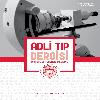Adli tıp uzmanları ve asistanlarının klonlamaya bakışı
Approach of forensic medicine experts to cloning
___
- 1.Bowring F. Therapeutic and reproductive cloning: a critique. Social Science and Medicine, 2004; 58: 401-409.
- 2.The Ethics Committee of the American Society for Reproductive Medicine. Human Somatic cell nuclear transfer (cloning). Fertility and Sterility, 2000; 74(5): 873-76.
- 3.The Ethics Committee of the American Society for Reproductive Medicine. Human Somatic cell nuclear transfer (cloning). Fertility and Sterility, 2004; 82(1): 236-39.
- 4.Maris Martinez S. Right to life vs right to a determined quality af life. Reflections human cloning. Law Hum Genome Rev, 2003; 18:77-114.
- 5.Triapitsyna N V, Glazko V I. Achievements and problems in cloning and making transgenic mammals. Tsitol Genet, 2002; 36(4): 57-71.
- 6.Uzan G. Therapeutic use of stem cells. Rev Prat, 2004; 54(13): 1399-403.
- 7.Pattinson S D, Caulfield T.Variations and voids: the regulation of human cloning around the world. BMC Med Ethics, 2004; 5(1):E9.
- 8.Hughes I A. A perspective on stem cells by a clinician. Eur J Endocrinol, 2004; 151: 3-5.
- 9.Christiansen S B, Sandoe P. Bioethics: limits to the interference with life. Animal Reproduction Science, 2000; 6,0-61: 15-29
- 10.Burley J. The ethics of therapeutic and reproductive human cloning. Seminars in Cell and Developmental Biology, 1999; 10: 287-294.
- 11.Trounson A. Hello again, Dolly. Molecular Medicine Today, 1999; 5: 423.
- 12.Reiss M J. Ethical dimensions of therapeutic human cloning. Journal of Biotechnology, 2002; 98: 61-70.
- 13.Daar A S, Bhatt A, Court E, Singer P A. Stem cell research and transplantation: science leading ethics. Transplant Proc, 2004; 36(8):2504-6.
- 14.Dhai A, Moodley J, McQuoid-Mason D J, Rodeck C. Ethical and legal controversies in cloning for biomedical rese a South African perspective. S Afr Med J, 2004; 94(11): 906-9.
- 15.Cregan K. Ethical and social issues of embryonic stem cell technology. Intern Med J, 2005; 35(2): 126-7.
- 16.Larijani B, Zahedi F. Islamic Perspective on Human Cloning and Stem Cell Research. Transplantation Proceedings, 2004; 36: 3188-89.
- 17.Andrea L, Bonnicksen Ph D. Human reproductive cloning: thinking about clinic-based ethics. Fertility and Sterility, 2001; 75(6):1057-8.
- 18.Valenzuela C Y. Scientific ethics of human cloning. Rev Med Chile, 2005; 133: 105-12.
- 19.Şenel B, Özaslan A, Çetin G, Şen H and Çelik S. Cloning-A Survey by Medical and Law Students of the Istanbul University. Forensic Science international, 2003; 136(1 ):336-7.
- ISSN: 1018-5275
- Yayın Aralığı: 3
- Başlangıç: 1985
- Yayıncı: BAYT Yayıncılık
Sürüntü yöntemiyle deri üzerindeki tükürük kalıntılarında amilaz enzim aktivitesinin tespiti
Hüseyin AYDIN, Yücel Fatma BEYAZTAŞ, Ahmet AKER, Doğu Barış KILIÇÇIOĞLU
İstanbul'da iş kazasına bağlı ölümler
İbrahim ÜZÜN, Nursel TÜRKMEN, Bülent ŞAM, Berna ŞENEL
İbrahim ÜZÜN, Mustafa U. KALAYCI, Berna ŞENEL, Yalçın BÜYÜK
Ramazan AKCAN, Hakan KAR, Necmi ÇEKİN, Ahmet HİLAL, Mustafa ARSLAN
Adli tıp uzmanları ve asistanlarının klonlamaya bakışı
Abdi ÖZASLAN, Gürsel ÇETİN, Nadir ARICAN, Berna ŞENEL
Yenidoğanda viral pnömoniye eşlik eden peliosis hepatis: Olgu sunumu
Ferah A. KARAYEL, Yalçın BÜYÜK, Uğur KOÇAK, Yüksel A. YAZICI
